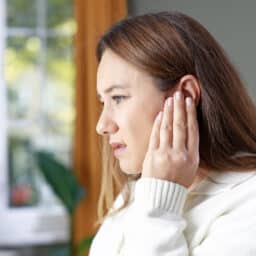How Can Hearing Aids Change Your Life?

Hearing loss often develops gradually, making it easy to ignore. But over time, it can affect how you connect with people, stay safe and move through the world. Let’s look at six real-life benefits of treating hearing loss to help you take that next step. Six Benefits of Hearing Loss Treatment Six amazing benefits of…
What To Know About Tinnitus Supplements

Tinnitus, the presence of ringing or buzzing in the ears, affects between 10 and 25% of adults. For some, tinnitus pops up for a few minutes every once in a while. For others, it’s a constant companion. If you live with chronic tinnitus, it’s understandable that you’d reach for any treatment method promising relief. One…
Improving Podcasts and Audiobooks for People With Hearing Loss

Enjoying audio content can be challenging for people with different levels of hearing loss, and nearly 15% of American adults have reported some trouble hearing. There are a few ways to make audio content more accessible so people with hearing loss can still enjoy content like podcasts and audiobooks. Ways to Make Audio Content More…
How Can I Accommodate My Hearing Loss in the Workplace?

Navigating the professional world with hearing loss can be challenging, but with the right strategies, you can excel and thrive in your career. Research shows that around 12% of workers experience hearing difficulty. While this can present unique obstacles, understanding these challenges and implementing effective solutions can make all the difference. Workplace Communication Challenges Workplace…
What To Know About the Connection Between Hearing Loss and Vitiligo

Hearing loss has many causes, ranging from loud noise exposure and aging to earwax blockages and head trauma. While it’s less well-known, some research suggests that there could be a connection between vitiligo, a condition causing skin discoloration, and hearing loss. Let’s take a look at this connection and what you can do to manage…
Your First Hearing Aids: Tips for Confidence and Comfort

Trying something new can feel like a leap into the unknown. Whether it’s a new hobby or a fresh pair of shoes, change can bring a mix of excitement and apprehension. For many, adjusting to hearing aids is no different. It’s normal to feel unsure at first, but you can build confidence with your hearing…
Staying Active with Hearing Aids: Tips to Safeguard Your Devices

According to the Centers for Disease Control and Prevention (2023), adults should aim for at least 150 minutes of moderate-intensity physical activity and two days of muscle-strengthening exercises each week. If you’re among the nearly 20% of people worldwide living with hearing loss, you might wonder how to achieve these fitness goals without compromising the…
How to Communicate Effectively With Family Members Who Have Hearing Loss

When a family member experiences hearing loss, it can lead to communication challenges that affect daily interactions and family dynamics. However, with some thoughtful adjustments, you can foster clearer communication and a stronger connection. Here are several strategies to help improve communication with loved ones dealing with hearing loss: Practical Tips for Improving Communication Making…
Yard Care and Hearing Protection: What to Know
As fall settles in and brings falling leaves and the need for seasonal yard work, many people find themselves busy preparing their lawns for the winter months. However, in the hustle of maintaining your yard, the potential harm that noisy equipment can have on your hearing often gets overlooked. With tools like leaf blowers, lawnmowers…
What Am I Missing With Hearing Loss?

Nearly 15% of American adults experience some form of hearing loss, ranging from mild to profound. Learning about the different stages of hearing loss helps to identify what sounds may be missed and emphasizes the importance of timely intervention. Let’s explore the different phases to understand their impact. Mild Hearing Loss Mild hearing loss often…